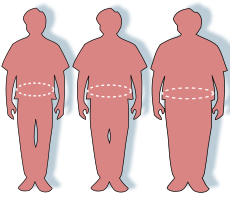I have some questions about America's obesity epidemic.
The New York Times has an article about a mathematician who has been looking for the causes of obesity-- In a A Mathematical Challenge to Obesity, an interview with Carson Chow, Claudia Dreifus notes that the average person weighs 20 pounds more now than in the 1970's. I was alive then and it was the hey-day of processed food back when skinny people fed their skinny kids white bread with butter and sugar. Mayonnaise (or rather Miracle Whip, what ever substance that might have been) was on everything, and oh for twinkies, ring dings, chef Boy-r-Dee, and scooter pies....those were the days.
The mathematician proclaimed that the answer is that there is more food. More is grown, more is available, it's cheaper and cheap food allows for the existence of fast food, something you can't have if the food costs a lot. What I've noticed is that food is everywhere. All the push to make school food healthier, get rid of soda machines, and encourage children to be more active (ah, the kids I know, even the heavy ones, are doing 3 hours a day of sports after school, it's no guarantee you'll be slender), but it seems that every day is a "special" day....a fund raising bake sale, someone's birthday, end of year party, weekly advisory where the kids rotate bringing baked goods, language class meal, trip to restaurant, snack parent at every sports game, followed by dinner, and when you go out, the servings are huge, and I, for one, find it hard to stop eating really good tasting food if I'm hungry and it's on my plate. So I'll believe that food availability is the reason why people are fatter.
So here's my question. Obesity researchers study obese people and how they differ from normal weight people. Why isn't everyone obese? Why are only 1/3 of Americans obese and only 1/3 are overweight? Why aren't they studying the people who remain thin despite the fact that they are surrounded by food? Okay, so some people have very fast metabolisms, but others are don't seem to have any desire to overeat. There may be lots of available food, but they don't want it, or they want it when they're hungry, but they have some and that's enough, a 'stop eating' mechanism kicks in at a point that keeps their weight low. Why don't they have the desire to eat more when food is available? And finally, there are those people who want more food, but for the sake of their health or their appearance, they limit their eating. I've heard it said, "Well, if she really wanted to be thin, she'd eat less." I don't buy it, I think there are differences between people besides a simple desire, or a weakness of character that makes self-control harder for some then for others. I want to know why some people have faster metabolisms, less desire to eat, or more will power. Okay, Dr. Carson, how does your mathematical model work for that one?
I'm not an alcoholic. It's not because alcohol isn't available-- at any given time my house is stocked with an assortment of beers (I keep dark on hand because Roy likes it) and wines. It's available, but most days, it's just not on my radar. It's not because I have great willpower. I like a drink or two, but after that I get very tired, and it's not fun to be out with people just wishing I could lie down. I'm not an alcoholic because I'm not wired to want to drink very often or very much. I tend to think it's the same with obesity: some people crave food, or the wrong food, or way too much food, and others don't. Availability may make it easier, but there are still thin people, and isn't it interesting that in more affluent socioeconomic circles, where food has always been readily available, obesity rates are lower.
As a society, we've made the statement that if you're fat, it's your fault. The obese are the last group of people that it's okay to pass judgement on. "Exercise more, Eat less." It's a simple recipe. Dr. Chow tells us there's no magic bullet. It's stigmatizing to take weight loss pills or have bariatric surgery. I've heard morbidly obese people say it's their own fault, as though they don't deserve to be thin, and they loathe themselves for eating too much. I sometimes wonder if our prejudices about obesity hinder pharmaceutical research because-- if anyone wants my vote-- there should be a magic bullet.

Tidak ada komentar:
Posting Komentar